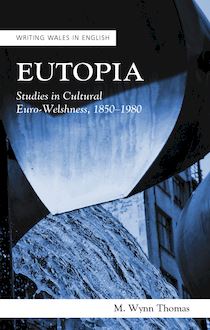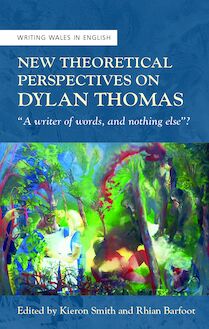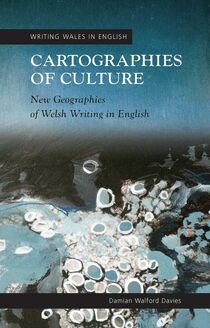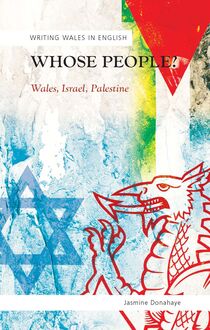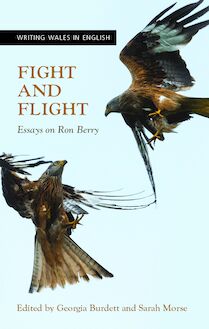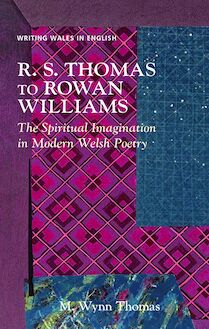Edward Thomas , livre ebook
150
pages
English
Ebooks
2012
Vous pourrez modifier la taille du texte de cet ouvrage
Obtenez un accès à la bibliothèque pour le consulter en ligne En savoir plus
Découvre YouScribe en t'inscrivant gratuitement
Découvre YouScribe en t'inscrivant gratuitement
150
pages
English
Ebooks
2012
Vous pourrez modifier la taille du texte de cet ouvrage
Obtenez un accès à la bibliothèque pour le consulter en ligne En savoir plus
Publié par
Date de parution
15 février 2012
Nombre de lectures
0
EAN13
9781783164851
Langue
English
Edward Thomas: The Origins of his Poetry builds a new theoretical framework for critical work on imaginative composition through an investigation of Edward Thomas’s composing processes, on material from his letters, his poems and his prose books. It looks at his relation to the land and landscape and includes detailed and illuminating new readings of his poems. It traces connections between Thomas’s approach to composition and the writing and thought of Freud, Woolf and William James, and the influence of Japanese aesthetics, and draws surprising and far-reaching conclusions for the study of poetic composition.
Publié par
Date de parution
15 février 2012
Nombre de lectures
0
EAN13
9781783164851
Langue
English
Edward Thomas
Writing Wales in English
CREW series of Critical and Scholarly Studies General Editor: Professor M. Wynn Thomas (CREW, Swansea University)
This CREW series is dedicated to Emyr Humphreys, a major figure in the literary culture of modern Wales, a founding patron of the Centre for Research into the English Literature and Language of Wales , and, along with Gillian Clarke and Seamus Heaney, one of CREW ’s Honorary Associates. Grateful thanks are due to the late Richard Dynevor for making this series possible.
Other titles in the series
Stephen Knight, A Hundred Years of Fiction (978-0-7083-1846-1)
Barbara Prys-Williams, Twentieth-Century Autobiography (978-0-7083-1891-1)
Kirsti Bohata, Postcolonialism Revisited (978-0-7083-1892-8)
Chris Wigginton, Modernism from the Margins (978-0-7083-1927-7)
Linden Peach, Contemporary Irish and Welsh Women’s Fiction (978-0-7083-1998-7)
Sarah Prescott, Eighteenth-Century Writing from Wales: Bards and Britons (978-0-7083-2053-2)
Hywel Dix, After Raymond Williams: Cultural Materialism and the Break-Up of Britain (978-0-7083-2153-9)
Matthew Jarvis, Welsh Environments in Contemporary Welsh Poetry (978-0-7083-2152-2)
Diane Green, Emyr Humphreys: A Postcolonial Novelist? (978-0-7083-2217-8)
Harri Garrod Roberts, Embodying Identity: Representations of the Body in Welsh Literature (978-0-7083-2169-0)
M. Wynn Thomas, In the Shadow of the Pulpit: Literature and Nonconformist Wales (978-0-7083-2225-3)
Linden Peach, The Fiction of Emyr Humphreys: Contemporary Critical Perspectives (978-0-7083-2216-1)
Daniel Westover, R. S. Thomas: A Stylistic Biography (978-0-7083-2411-0)
Edward Thomas
The Origins of his Poetry
Writing Wales in English
JUDY KENDALL
© Judy Kendall, 2012
All rights reserved. No part of this book may be reproduced, stored in a retrieval system, or transmitted, in any form or by any means, electronic, mechanical, photocopying, recording or otherwise, without clearance from the University of Wales Press, 10 Columbus Walk, Brigantine Place, Cardiff, CF10 4UP. www.uwp.ac.uk
British Library Cataloguing-in-Publication Data A catalogue record for this book is available from the British Library.
ISBN: 978-0-70832-403-5 eISBN: 978-1-78316-485-1
The right of Judy Kendall to be identified as author of this work has been asserted by her in accordance with sections 77 and 78 of the Copyright, Designs and Patents Acts 1988
Cover image: Portrait of Edward Thomas in 1899, Heinz Archive Library, National Portrait Gallery, London; by permission of Rosemary Vellender and the Estate of Edward Thomas.
Diana Louise Kendall 1924–2008
C ONTENTS
General Editor’s Preface
Acknowledgements
Note on the Text and Abbreviations
Introduction: Studying the Composing Process
1 Starting Points – How Poems Emerge
2 Poetry and Oral Literature
3 Ellipses and Aporia
4 Gaps
5 Unfinishedness …
6 Temporal Dislocation
7 Dislocating Thought
8 Divagations
Appendices
Notes
Select Bibliography
G ENERAL E DITOR’S P REFACE
The aim of this series is to produce a body of scholarly and critical work that reflects the richness and variety of the English-language literature of modern Wales. Drawing upon the expertise both of established specialists and of younger scholars, it will seek to take advantage of the concepts, models and discourses current in the best contemporary studies to promote a better understanding of the literature’s significance, viewed not only as an expression of Welsh culture but also as an instance of modern literatures in English worldwide. In addition, it will seek to make available the scholarly materials (such as bibliographies) necessary for this kind of advanced, informed study.
M. Wynn Thomas CREW ( Centre for Research into the English Literature and Language of Wales ) Swansea University
A CKNOWLEDGEMENTS
Thanks to Shelley Saguaro, Alan Brown and Simon Dentith for patient advice during the germination of the ideas in this book; Philip Gross for tactful, astute responses; University of Gloucestershire for practical support; University of Salford, and in particular Jocelyn Evans and Lucie Armitt, for practical support and publication funding; Lorna Scott and Caro McIntosh of University of Gloucestershire Archives; Colin Harris and the staff of Oxford University Bodleian Special Collections Reading Rooms; the Battersea Public Library Local History Department; the Hawthornden Fellowship for an extended secluded period of support; and the Kendall family for the loan of Barrow Road.
Thanks also to Martin Randall, Diana Kendall, Geoff Caplan, Edward Thomas Fellowship, Richard Emeny, Anne Harvey and Chris B. McCully for scholarly support.
I am grateful to the Edward Thomas Estate for generous permission to use unpublished and published material on Edward Thomas; the Bodleian Library, University of Oxford, owners of Letters to Walter de la Mare (Eng lett 376), for kind permission to use Edward Thomas’s unpublished letters to de la Mare; and Alec Finlay for graciously allowing the use of an unpublished circle poem.
N OTE ON THE T EXT AND A BBREVIATIONS
Thomas’s editors seem at times to have viewed the provisional quality inherent in his poetry too literally. In PN Review 103, John Pikoulis detailed the liberties taken by R. G. Thomas in the classic Collected Poems (1978). Subsequent editors silently amended some of these, as in the 2004 Faber and Faber re-issue of R. G. Thomas’s edition. In 2008, the record was set straight in more than one sense by Edna Longley’s Edward Thomas: the Annotated Collected Poems , a substantial revision of her 1973 Poems and Last Poems . Her ‘Note on texts’ acknowledges the difficulty of alighting on final versions or titles of Edward Thomas poems, and states her editorial decision to stay with titles that have run the course of time. She generously gives context to apparently high-handed dealings with Thomas manuscripts in the past, revealing how R. G. Thomas’s selection, and creation, of titles for poems in the definitive Collected Poems resulted from lack of access to the printer’s typescript of Edward Thomas’s choice of text in the 1917 Poems . Such scrupulousness asserts Longley’s edition as a genuine contender for the new definitive Edward Thomas text and it remains therefore the main text referred to here, although note is taken of the different versions and successive drafts of poems recorded in R. G. Thomas’s 1978 edition. For the sake of consistency, titles are taken from Longley’s Annotated Collected Poems , but a list of major differences from R. G. Thomas’s Collected Poems appears in the appendices. For frequently appearing sources, abbreviated references are given in the text. Less obvious abbreviations include:
ANCP
Edward Thomas: the Annotated Collected Poems , ed. Edna Longley (Newcastle: Bloodaxe Books, 2008)
Berridge
The Letters of Edward Thomas to Jesse Berridge , ed. Anthony Berridge (London: Enitharmon, 1983)
Between
Virginia Woolf, Between the Acts (London: Hogarth Press, 1941)
Blackbirds
Edward Thomas, Four- and- Twenty Blackbirds (London: Duckworth, 1915)
Bottomley
Letters from Edward Thomas to Gordon Bottomley , ed. R. G. Thomas (London: Oxford University Press, 1968)
Celtic
Edward Thomas, Celtic Stories (Oxford: Clarendon Press, 1911)
CP
The Collected Poems of Edward Thomas , ed. R. G. Thomas (Oxford: Oxford University Press, 1978)
DC
Daily Chronicle (London, August 1901 to February 1913)
ETF
Edward Thomas Fellowship Newsletter
Eng lett 376
Bodleian MS, Eng lett c 376, Letters to Walter de la Mare
FIP
Feminine Influence on the Poets (London: Martin Secker, 1910)
Georgians
Edward Thomas on the Georgians , ed. Richard Emeny (Cheltenham: Cyder Press, 2004)
Garnett
A Selection of Letters to Edward Garnett , ed. Edward Garnett (Edinburgh: Tragara Press, 1981)
LFY
Eleanor Farjeon, Edward Thomas: The Last Four Years (Oxford: Oxford University Press, 1958)
Light
Light and Twilight (London: Duckworth, 1911)
NLW
National Library of Wales
Norse
Norse Tales (Oxford: Clarendon Press, 1912)
Portrait
R. G. Thomas, Edward Thomas: a Portrait (Oxford: Clarendon Press, 1985)
PW
Edna Longley, Poetry in the Wars (Newcastle: Bloodaxe, 1986)
‘Reading’
‘Reading out of doors’, Atlantic Monthly , 92 (1903), 275–7
SC
The South Country (London: Dent, 1909)
Selected Letters
Edward Thomas: Selected Letters , ed. R. G. Thomas (Oxford: Oxford University Press, 1995)
Sheaf
The Last Sheaf (London: Jonathan Cape, 1928)
Welsh Writing
Judy Kendall, ‘“A Poet at Last”; William H. Davies and Edward Thomas’, in Katie Gramich (ed.), Almanac: Yearbook of Welsh Writing in English (Cardigan: Parthian, 2008), pp. 32–54
P. J. Croft notes, ‘the continual fluctuations in shape and size and the flexible spacing of handwritten text cannot be accurately imitated in the relative fixity of print’. 1 Reproductions of Edward Thomas’s handwritten orthography in the mechanical medium of print are therefore necessarily approximate. The appendices include an example of his handwriting and original manuscripts are accessible on the Oxford University First World War Poetry Digital Archive. The abbreviations and lack of punctuation in a number of Thomas’s notes and letters are left strategically in place since these reflect their status as immediate comments on his composing processes.
Introduction: Studying the Composing Process
There is nothing to it. You only have to hit the right notes at the right time and the instrument plays itself.
Johann Sebastian Bach 1
Edward Thomas: the Origins of his Poetry takes the reader into dark, unknown areas of poetic composition in order to excavate a tunnel to a more illumined place. The focus is on the poems and prose of Edward Thomas, a fearless, challenging, typically elusive writer on the composing process. To assist on this journey, reference is made to a range of his writings. These offer a wealt
